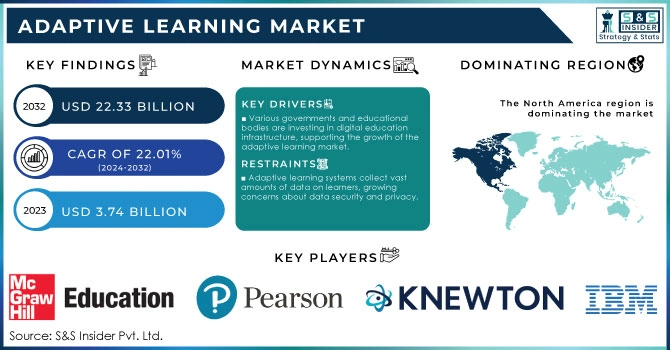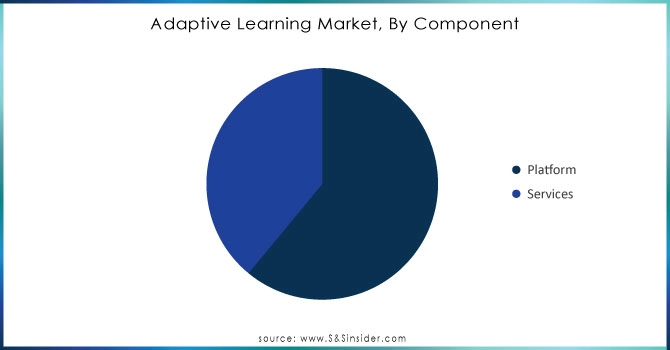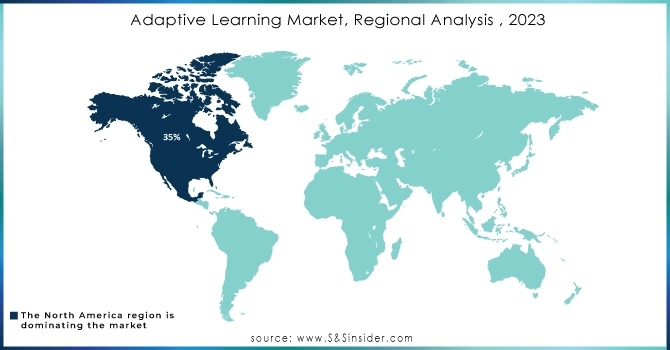Adaptive Learning Market Report Scope & Overview:

Get more information on Adaptive Learning Market - Request Free Sample Report
The Adaptive Learning Market Size was valued at USD 3.74 Billion in 2023 and is expected to reach USD 22.33 Billion by 2032, growing at a CAGR of 22.01% over the forecast period 2024-2032.
The adaptive learning market has experienced significant growth in recent years, driven by technological advancements and a growing need for personalized education experiences. With the rise of digital learning platforms, especially during the pandemic, the demand for adaptive learning solutions has surged. Digital learning is witnessing remarkable growth, with around 90% of organizations now providing digital training to their employees. This shift is accompanied by the rising significance of adaptive learning technologies, which personalize educational experiences to meet individual learner needs. Approximately 68% of employees prefer learning at work, highlighting the need for solutions that can cater to diverse learning styles and paces. Platforms like Coursera are at the forefront of this trend, with registered learners increasing by 438% over the past five years, reaching 136 million. Their adaptive learning features, driven by content from major companies like Google, are pivotal to their consumer revenue growth, projected to contribute USD 100 million. In the USA, many organizations report a 42% boost in income due to digital learning adoption, with adaptive learning contributing to an 18% increase in employee engagement among businesses implementing these programs.
The integration of adaptive learning is particularly impactful in K-12 education, where students often have varying levels of understanding and learning speeds. Academic institutions are increasingly adopting adaptive learning tools, with 64% of middle school students in the USA using digital learning daily. This transformation underscores the effectiveness of adaptive learning in improving educational outcomes, with 81% of students indicating that these tools help them achieve better grades. Adaptive learning platforms can help teachers better manage these differences by providing real-time insights into student progress, enabling them to intervene when necessary. This is especially useful in subjects like mathematics and reading, where the mastery of foundational concepts is crucial. The system’s ability to provide immediate feedback helps to keep students engaged and reduces frustration, ultimately leading to improved educational outcomes. As the demand for personalized education continues to grow, the adaptive learning market is poised for further expansion, making it a critical area for investment and innovation in the education technology sector.
Adaptive Learning Market Dynamics
Drivers
-
Various governments and educational bodies are investing in digital education infrastructure, supporting the growth of the adaptive learning market.
Governments and educational organizations around the globe are putting more resources into digital education infrastructure, leading to expansion in the adaptive learning sector. The objective of this move to digitalization is to enhance the availability of high-quality education, especially in remote and underserved regions. Through the utilization of adaptive learning technologies, institutions can provide customized learning experiences that cater to each student's specific needs, leading to improved engagement and results. Adaptive learning platforms employ AI and machine learning algorithms to assess students' advancement, pinpointing their areas of strength and areas for improvement, and consequently modifying the material and speed of learning accordingly. In the United States, both federal and state governments have launched different initiatives, like the "Digital Equity Act" and the "E-Rate" program, to enhance internet availability and supply schools with digital resources. These efforts promote the use of adaptive learning platforms in K-12 schools and higher education institutions, enabling a more engaging and personalized learning experience. In Europe, the European Union has additionally placed focus on digital education with the "Digital Education Action Plan," which aims to incorporate technology in education. The implementation of adaptive learning systems in educational institutions throughout the area has led to increased accessibility and customization of education for each student's unique learning journey.
-
Combining adaptive learning with other technologies such as virtual reality (VR), augmented reality (AR), and gamification creates more immersive and effective learning experiences.
Integrating adaptive learning with virtual reality (VR), augmented reality (AR), and gamification boosts the efficacy of learning encounters, generating more captivating and immersive settings. Adaptive learning systems customize educational content for each learner, adapting the speed and difficulty of material according to their advancement. When combined with VR technology, students can fully engage in 3D simulations, participating in experiences that are challenging to recreate in typical educational settings, like virtual excursions or medical practice scenarios. This enhances memory retention and enables learners to use concepts in real-life scenarios. For example, in healthcare, adaptive learning systems along with VR technology can replicate intricate surgical processes, offering individualized guidance and adjusting scenarios based on the learner's abilities and advancement. This interactive method improves skills more effectively than traditional training techniques. Likewise, incorporating augmented reality (AR) in adaptive learning aids in visualizing complex ideas. In areas such as engineering and architecture, AR can superimpose 3D models into the real world, enabling students to engage with their designs in live settings. These technologies reinforce concepts by tailoring content to fit the learner's comprehension.
Restraints
-
Adaptive learning systems collect vast amounts of data on learners, growing concerns about data security and privacy.
Adaptive learning systems collect extensive amounts of information on users to customize learning experiences, such as personal details, learning habits, advancement, and likes. This information is essential for improving algorithms and providing personalized content, but it also poses risks about storing, transmitting, and using sensitive data. Due to the rising number of data breaches and cyber-attacks around the world, there is a growing worry among educational institutions, businesses, and individuals about the possible misuse or unauthorized access to their information. For instance, in higher education institutions that utilize adaptive learning platforms such as Coursera or Blackboard, student learning tracks, and personal information are saved to tailor course delivery. If this information is breached, it may result in identity theft or unapproved entry to educational documents, affecting students' confidentiality and security. Likewise, in corporate training settings where adaptive learning tools are employed to enhance employees' skills, such as in tech firms utilizing Udemy for Business or SAP Litmos, the disclosure of employees' performance data could present dangers to both individuals and companies by exposing confidential strategic details.
Adaptive Learning Market Segmentation Overview
By Component
The platform segment dominated in 2023 with a 56% market share in the adaptive learning market. Platforms play a key role in adaptive learning systems, providing individualized learning routes through the use of AI and data analysis. These systems evaluate how well students are doing and customize the material to suit their specific requirements, improving educational results. Combining multimedia content, assessments, and progress tracking, they offer a complete educational solution for both schools and businesses. DreamBox and Knewton offer adaptive learning platforms for K-12 and higher education, allowing educators to customize content based on student progress.
The services segment is projected to become the fastest-growing during 2024-2032 in the adaptive learning market, driven by the need for support in deploying and maintaining adaptive learning solutions. Services such as implementation, integration, training, and technical support are provided to ensure that adaptive platforms are used effectively. This part is crucial for institutions and businesses moving towards digital educational settings. McGraw-Hill Education and similar companies offer guidance and assistance to schools in implementing adaptive learning, aiding in the integration of platforms into their curriculum.

For more details or need any customization data on Adaptive Learning Market - Enquiry Now
By Type
The individuals segment led the market in 2023 with a 64% market share and is characterized by personalized educational experiences aimed at learners outside the corporate environment. This section consists of students, people who continue learning throughout their lives, and individuals who are driven to enhance their skills or knowledge through customized learning pathways. The quick integration of digital learning tools has enabled individual learners to interact with material that adjusts to their specific learning preferences and requirements, ultimately enhancing the accessibility and effectiveness of education. Businesses such as Khan Academy demonstrate this sector by offering a variety of adaptive learning materials that support individuals of all ages in advancing at their speed.
The business segment is anticipated to grow at a faster CAGR in the adaptive learning market during 2024-2032. Companies increasingly recognize the value of personalized training programs that cater to diverse employee learning styles and paces. This segment is driven by the demand for upskilling and reskilling in fast-evolving industries, enhancing employee engagement and retention. Businesses leverage adaptive learning platforms to deliver targeted content that addresses specific skills gaps, thereby optimizing workforce performance. For instance, companies like SAP utilize adaptive learning technologies in their training modules to ensure employees receive customized learning experiences that align with their professional development goals.
Adaptive Learning Market Regional Analysis
North America dominated with a 35% market share in the adaptive learning market in 2023, primarily due to its advanced educational technology infrastructure, significant investments in e-learning solutions, and a strong presence of leading companies. Adaptive learning technologies have been adopted in both K-12 and higher education in the United States and Canada, providing personalized learning experiences tailored to students' individual needs. McGraw-Hill Education and Pearson are examples of companies that have created adaptive learning platforms that use data analytics to customize content and assessments for improved learning results. Furthermore, the market's expansion in this area has been driven by the growth of online education and the growing need for customized learning approaches.
The Asia-Pacific region is anticipated to have the fastest CAGR during 2024-2032, driven by a rising population of learners, increasing adoption of technology in education, and government initiatives aimed at enhancing digital literacy. Countries like China, India, and Japan are investing heavily in educational technologies to cater to diverse learning needs. The demand for personalized learning solutions is surging as educational institutions seek to improve student engagement and outcomes. Companies like Byju’s in India and Smart Sparrow in Australia are making strides by offering adaptive learning platforms that customize educational content based on individual performance metrics.

Key Players in Adaptive Learning Market
The major key players in the Adaptive Learning Market are:
-
McGraw-Hill (ALEKS, Connect)
-
Pearson (MyLab, Mastering)
-
Knewton (Knewton Alta, Knewton API)
-
IBM (IBM Watson Education, IBM SPSS Modeler)
-
DreamBox (DreamBox Math, DreamBox Insights)
-
Smart Sparrow (Adaptive Elearning Platform, Adaptive Learning Analytics)
-
Carnegie Learning (MATHia, Literacy, and Learning Solutions)
-
Edmentum (Edmentum Courseware, Exact Path)
-
Lexia Learning (Lexia Core5, Lexia PowerUp)
-
Scholastic (Scholastic Learning Suite, Scholastic Math)
-
McGraw Hill Education (ALEKS, SimNet)
-
Instructure (Canvas, MasteryPaths)
-
Zybooks (Zybook, ZyLab)
-
Squirrel AI Learning (Squirrel AI Intelligent Learning, Adaptive Learning Platform)
-
Yuanfudao (Yuanfudao Adaptive Learning System, Yuanfudao English Learning App)
-
NovoEd (NovoEd Adaptive Learning Platform, Team-Based Learning)
-
Skillshare (Skillshare Adaptive Learning, Skillshare Premium)
-
Coursera (Coursera for Business, Specializations)
-
Udacity (Nanodegree Programs, Udacity Business)
-
Moodle (Moodle Workplace, Moodle Academy)
Suppliers of Software:
-
Intel
-
NVIDIA
-
Qualcomm
-
Broadcom
-
Texas Instruments
-
Microchip Technology
-
Advanced Micro Devices (AMD)
-
Analog Devices
-
Infineon Technologies
-
Maxim Integrated
Recent Development
-
October 23, 2024: Mighty Doodle, a new AI-powered literacy lesson platform for young students, launches today on the Apple App Store. The app, designed for kids in 1st to 4th-grade levels, provides personalized and adaptive learning experiences that helps learners develop reading, writing, and spelling skills.
-
October 21, 2024: Anthology has joined forces with Obrizum, an artificial intelligence and analytics developer in Cambridge to embed each of Obrizum's adaptive learning technology platforms into the Blackboard LMS The partnership, which is being announced at Anthology's 2024 user conference will help millions of students and educators globally deliver a more personalized learning experience enriched with AI.
-
June 2024: PhaseV, a leader in software and machine learning (ML) focused on adaptive clinical trial design announced today the next version of its AdaptV platform for optimal design and closed-loop execution of adaptive clinical trials.
| Report Attributes | Details |
| Market Size in 2023 | US$ 3.74 Billion |
| Market Size by 2032 | US$ 22.33 Billion |
| CAGR | CAGR of 22.01% From 2024 to 2032 |
| Base Year | 2023 |
| Forecast Period | 2024-2032 |
| Historical Data | 2020-2022 |
| Report Scope & Coverage | Market Size, Segments Analysis, Competitive Landscape, Regional Analysis, DROC & SWOT Analysis, Forecast Outlook |
| Key Segments | • By Component (Services, Platform) • By End-user (Higher Education, K-12, Corporate, Others) |
| Regional Analysis/Coverage | North America (US, Canada, Mexico), Europe (Eastern Europe [Poland, Romania, Hungary, Turkey, Rest of Eastern Europe] Western Europe [Germany, France, UK, Italy, Spain, Netherlands, Switzerland, Austria, Rest of Western Europe]), Asia Pacific (China, India, Japan, South Korea, Vietnam, Singapore, Australia, Rest of Asia Pacific), Middle East & Africa (Middle East [UAE, Egypt, Saudi Arabia, Qatar, Rest of Middle East], Africa [Nigeria, South Africa, Rest of Africa], Latin America (Brazil, Argentina, Colombia, Rest of Latin America) |
| Company Profiles | McGraw-Hill, Pearson, Curriculum Associates, Wiley, I station, Area9 Lyceum, ScootPad, Cog Books, VitalSource, DreamBox, Impelsys, Mathspace, Fulcrum Labs, Knowre, Follett, Imagine Learning, Cerego , Realizeit, K11, Houghton Mifflin Harcourt. |
| Key Drivers | • Rising Demand for Personalized Learning • Need for Advanced and Innovative E-Learning Software |
| Market Opportunities | • Adaptive Learning Vendors will benefit from growing demand for gamification in Adaptive Learning. • Boosting the use of blended learning technology |

